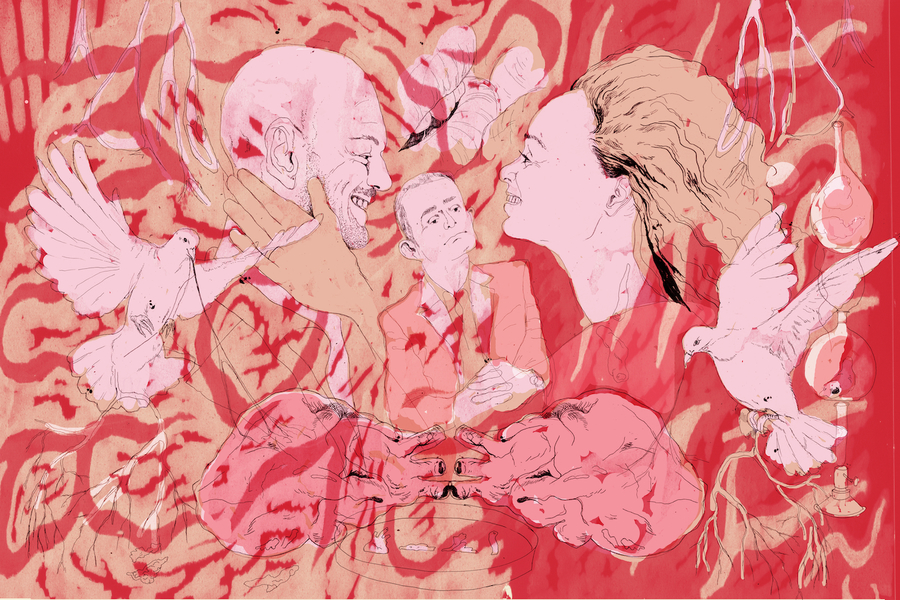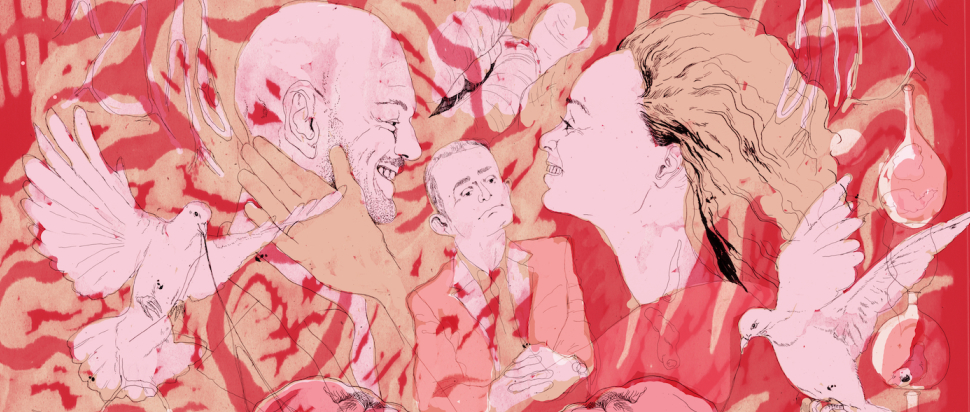Love Lessons with Married At First Sight Australia
Trusting the process, causing chaos and traumatising those around you – welcome to the world of Married At First Sight Australia
This Valentine's Day, we bring you an extra-special long read – 1600 words, give or take, on the best guidebook to love we know. There can be no conversation about love without Married At First Sight Australia and, as we eagerly await another endless season of MAFSA to hit UK screens, The Skinny's Editor-in-Chief Rosamund West takes a deep dive into The Process and what it tells us about love and being human.
This article was first published in our email newsletter, The Skinny Zap – for weekly events round-ups, a monthly guide to our new issue, and more stuff like *this*, sign up to the Zap here

Illustration: Miranda Stuart
The Process begins
To commit to MAFSA viewership is to truly commit – one season was fifty episodes long, or at least it felt like that. With each episode coming in at an hour in length, that’s more than two full days spent watching Australians pretend to fall in love with each other. Per season. I have personally watched at least six seasons. Almost none of these people are still married.
The format is highly structured and an internal language has evolved to reflect the seriousness of The Process. The Process is referenced frequently – the participants should trust The Process. The Process has been created by professionals who know what they are doing. The Process has a spectacularly low success rate which no one ever acknowledges.
The Process is ostensibly steered by the experts (pronounced ixperts), some of whom are experts, although whether they are qualified in any professional sense remains unclear. One of them is a retired cricketer who was just really good at giving his pals advice, or something? It’s easy to disparage John because he’s a former cricketer who now doles out advice on a fake relationship experiment and sort of tortures people by refusing to allow them to leave abusive relationships he’s pretended to design. BUT, John has learned in his many seasons that his main job is providing accountability for the various human red flags who grace his couch, and now he sometimes lets people leave when they’re married to a clear abuser. So John, too, has grown from The Process.
The Process begins with the ixperts poring over photos of potential brides and grooms and discussing how their various personality traits and traumas could be paired to create really excellent drama a lifelong love match. This woman has an anxious attachment style formed by a lifetime of abandonment – should we perhaps match her with this controlling narcissist? (Shoutout to Melissa and Bryce, a terrible pairing and one of the show’s few success stories.) These two are both old so they’ll definitely get on due to their desperation.
That was the strategy that gave us the gift of free spirit yoga monster Deborah being carried in on a litter to marry premature codger and father of two John. Deborah was very vocal about her disappointment that John was not a Polynesian man, because she’d explicitly ordered a Polynesian man. The marriage went so badly John was invited to return in a later season, which ended less badly but still not well. Eventually, the ixperts abandon the pretence and just start chucking people together because their pictures are near each other on the table.
“Look, I’m not your therapist, this isn’t therapy”
After they’re matched, there are Hens and Bucks Nights so alliances and enmities can begin to form. Australia doesn’t seem to have very strong restrictions on the amount of alcohol you can feed a group of people you’re keeping captive and psychologically manipulating for entertainment, and it really shows.
We’re introduced to each participant with the traditional reality VT, a quick run through their various tragedies, triumphs and nascent red flags. Then come The Weddings, which inevitably include large quantities of drama because these people are – I cannot emphasise this enough – strangers who have been matched at random by television producers. The happy couple are interviewed about their first impressions of their new spouse, for some reason not remembering that these will be used against them in a future episode.
If they’ve survived that, they’re shipped off on The Honeymoon to spend some intimate time with the stranger they’ve just married, along with a small team of film crew and producers. This is when things really start to unravel, as people’s actual personalities begin to emerge. When Season 6’s Heidi tried to open up to new husband Mike on a beach in the Whitsundays, he immediately cut her off, saying “Look, I’m not your therapist, this isn’t therapy.” This told us everything we needed to know about Mike. A transparent narcissist, Mike also loves to backpack, staying in hostels despite being literally double the age of the other backpackers. I’ve met so many Mikes, usually travelling with a guitar or a book on reiki, trying to fuck 20-year-olds.
After The Honeymoon, they’re moved back to a Sydney aparthotel block where they will be experimented upon for an undisclosed time frame. It’s never been explained how all these people can just give up their jobs for three months to marry a stranger. Are they working when they’re off camera? Many of them have children, most notably Season 10’s Alyssa, who used the having of a child as the justification for any and all terrible behaviour. “I have a child,” she said, repeatedly. But when do they see them? Again, never explained.
'The Dinner Party is basically a fight club'
They’re allowed out twice a week, once for The Commitment Ceremony and once for The Dinner Party. The Commitment Ceremony is a sacred space where each couple must reaffirm their desire to stay in The Experiment. They are only allowed to leave The Experiment if both parties wish to do so, so we are often treated to the spectacle of people being held within The Experiment against their will. The archetypal example was Season 6’s Mick and Jessika – Mick a simple sheep farmer from rural Queensland, Jessika just a woman with a desire for fame who wanted to grow her Instagram following. Jessika embarked upon an affair with fellow contestant Dan and refused to let Mick leave so Mick remained in his aparthotel purgatory, begging to be liberated week after week.
The Commitment Ceremony is also the space where the contestants explore the issues in their frankly cursed unions. It’s the space that feels a little bit radical – MAFSA has gradually challenged the orthodoxy of Australian masculinity; men here are allowed, nay encouraged, to be vulnerable. In Season Ten, when Josh broke down on the couch because he had been paired with a controlling bully who disparaged him publicly and privately, the men supported him, the ixperts made space for his feelings and even, in a first for the show, allowed him to leave rather than continue to be trapped in an aparthotel with his abuser. It felt like a breakthrough for everyone involved, although it’s unfortunate that Josh had to go through all the deliberately engineered abuse to get there.
The Dinner Party, on the other hand, is basically a fight club, and one of the main appeals of MAFSA viewing. Sometimes the producers chuck in boxes of antagonistic questions to really stir things up. People slope off to side rooms to plot infidelity, egged on by the producers, while the ixperts sit in a different side room, watching the chaos unfold on screens, aghast.
There’s a dawning realisation that the ixperts are as in the dark as the participants – they are just the producers’ puppets, the fall guys, who don’t have a clue what traps are being set or how insanely they will be edited. We look to them for accountability, but can they ever truly deliver it with their limited perspective of what’s really happening? Is humanity not, ultimately, essentially flawed by the limitations of our own perception?
Stay cunty, Mike
The participants must run the gamut of Commitment Ceremonies, Dinner Parties and assorted psychological games, ranging from intimacy challenges (sex with your new spouse is encouraged and interrogated) to home stays. If they can survive all that, Do the Work and adhere to The Process, they might arrive at Final Dates. For Mike and Heidi’s Final Date, the producers Mike arranged a boat ride in Sydney harbour, ignoring the fact that Heidi suffers from sea sickness, and had told him she suffered from sea sickness. She spent the date wrapped in a blanket looking green, while Mike dangled from the crow’s nest, swigging champagne. Stay cunty, Mike.
After that, they’re all sent home to think about whether they want to follow up their initial fake wedding with another fake wedding, which is called Final Vows. If they both commit then they leave the experiment together but, crucially, with no further binding agreement to do anything. Maybe they live on different sides of the continent of Australia, say, a four-hour flight away? Maybe they were just in it to grow their Instagram following, in which case they need to make a careful calculation about whether they have greater currency individually or as a couple. Post-Final Vows ghosting is a frequent occurrence, which is perhaps a little short-sighted because they have now stepped over the threshold into tabloid notoriety and the shadowlands of post-reality show life.
There’s one final reckoning, a Reunion show where everyone has now seen what everyone else has said about them, so they’re all put in a room to fight and get shouted at by John a bit more. The producers and editors have done their work, and created a compelling drama out of the reality they have structured with the humans who stumbled into their web looking for love or social clout.
The viewers may have learned something, although more likely they have not. The participants are released, to return to their lives or choose the half life of further reality shows, entering the churn of Love Island, The Apprentice and, if they hang around long enough, Celebrity Big Brother. The producers begin the process of recruiting their next cohort – the wheel turns, the seasons change and everything is as it should be.
